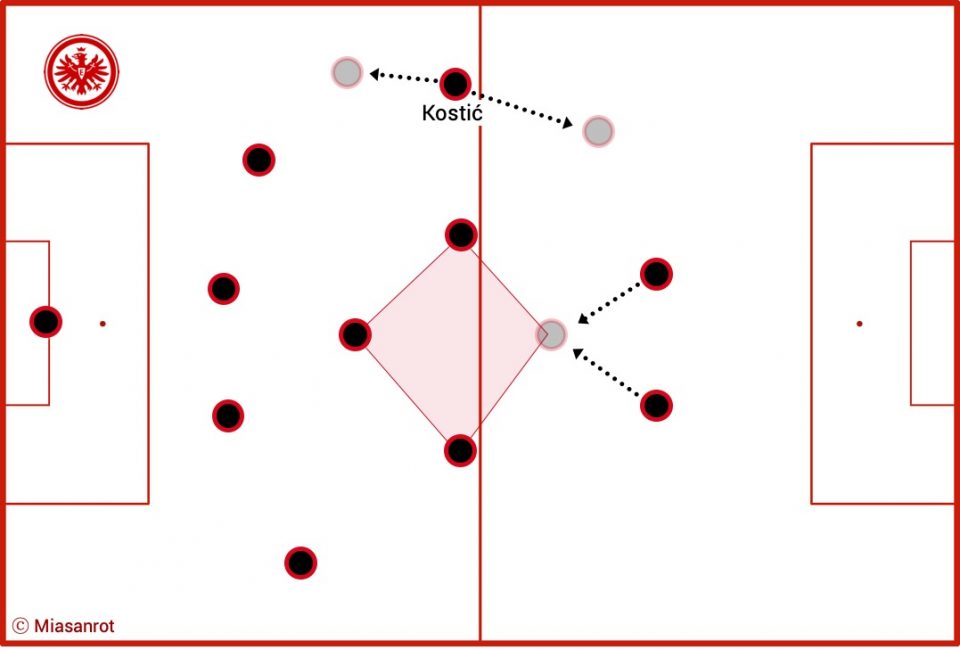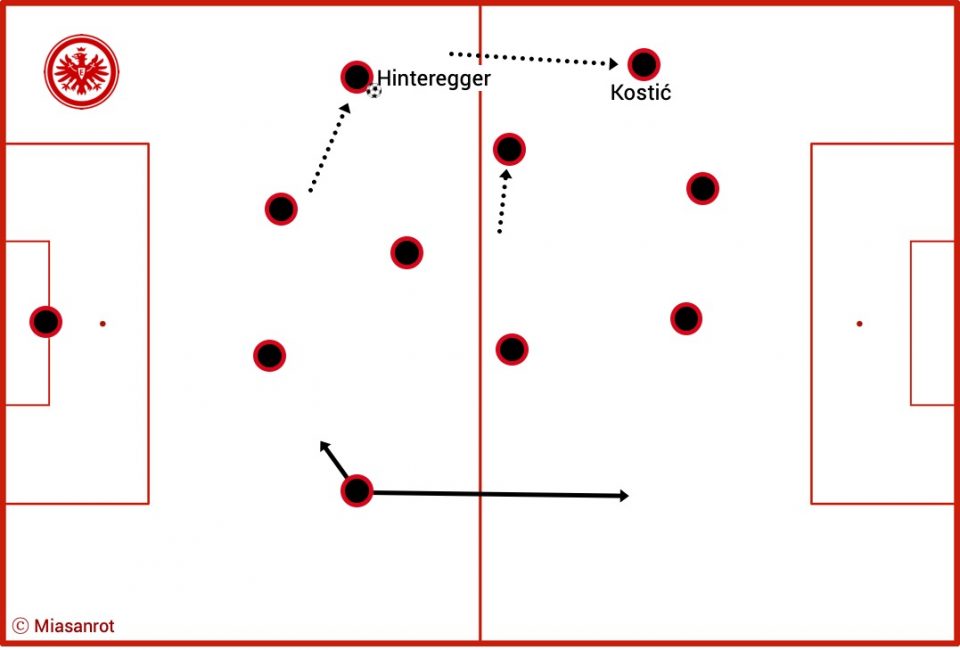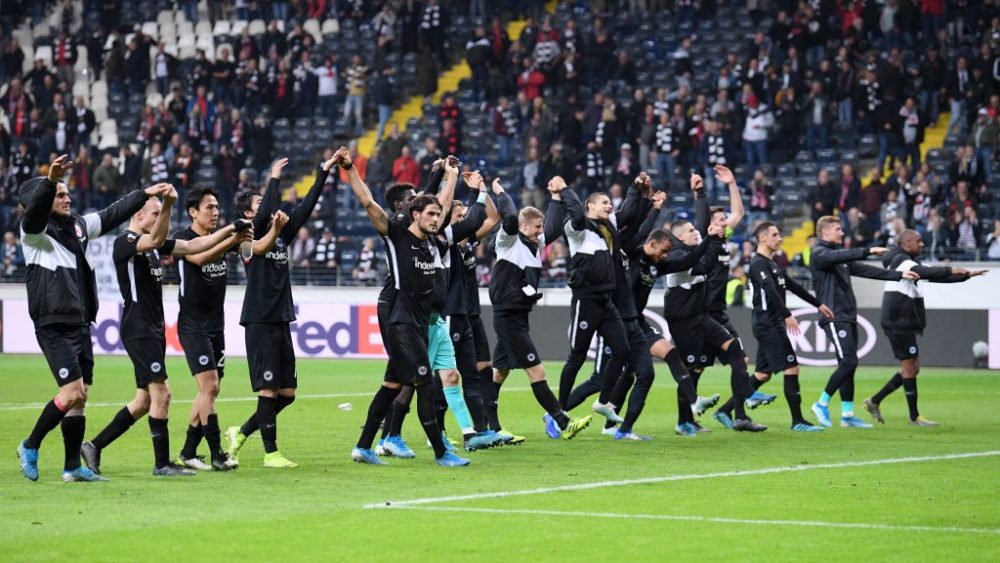Bundesliga MD 10 Preview: Frankfurt against Bayern
“They have the best supporters of the league over there [in Frankfurt], that’s for sure.” What might seem an innocuous statement at first glance quickly turned into Niko Kovač’s latest gaffe in an ever extending sequence of blunders of his lately. Had someone like Jupp Heynckes said the same thing, probably nobody would have got half as excited.
Because what of it? Kovač just happens to believe that Frankfurt has the league’s best supporters, and there are good reasons to think so. Every team in the world finds it difficult to steal points from Frankfurt. When the team manages to electrify their supporters, usually all hell breaks loose and the stadium turns into bedlam. But sometimes it seems more important who says something than what they say. And a statement like this coming from a coach who is going through a rough patch at the moment gives rise to all manners of controversy.
Irrespective of how justified his opinion is and how well-advised it was for him to say something like this only days after his team managed to just scrape by against Bochum in the cup, the resulting excited hubbub demonstrates just how grave the doubts about Kovač at Bayern have become. It does not take a prophet to predict that these doubts will swell even further if Bayern fails at their difficult test against Frankfurt at the weekend.

Frankfurt: a well-oiled machine?
It is a difficult test because in Frankfurt, Bayern could face their most complicated challenge yet. Leipzig’s game suited Bayern and Tottenham’s current condition rules them out as serious contender. This is not meant to downplay Bayern’s strong performances over long periods in both matches. It just means that there are tougher nuts to crack for Bayern yet.
Some of these nuts are coming now. The one against Frankfurt is the first in a series of tough matches in the coming weeks that include Dortmund, Leverkusen, and Gladbach. Yet of all of these teams, Frankfurt might be the one whose weaknesses are the best match for Bayern’s strengths.
Under coach Adi Hütter, Frankfurt has become a well-oiled machine capable of consistently performing well. There is the occasional dud performance, of course. In “English weeks” especially, the team finds it hard to maintain their intensity. This is to be expected and perfectly normal. Nevertheless, it is impressive how the team has managed to become a regular fixture in the upper half of the table over recent years.
Tactical flexibility
If you want to see a good example of how little a team’s basic formation is able to tell about how a team will play if you do not regard the dynamic aspect of tactics, you need look no further than Frankfurt. In reaction to the disappointing start to last season, Hütter has embedded a stable framework in his team: a back three complemented by two wing-backs, three midfielders, and two strikers. And yet, simply calling it a 5-3-2 would not do Hütter’s tactics sufficient justice.

Let us look at two positions specifically to elucidate this: first, there is the left wing-back position occupied by Filip Kostić, who has already been involved in nine goals in all competitions for Frankfurt this season. As left wing-back, he plays in the same position on the left as his counterpart Danny da Costa on the right in theory, but he interprets his role much more offensively and usually takes up a much higher position on the pitch. As a result, Frankfurt’s shape tends to be fairly asymmetrical at times. The hole Kostić leaves at the back is filled by the remaining players in the back line shifting to the left in unison if required. So in practice, Frankfurt’s original 5-3-2 regularly morphs into a 4-1-3-2, 4-3-3 or another sort of hybrid. On the right-hand side, da Costa is also given the freedom to venture forward if the opportunity presents itself, which leaves behind a back three in defense.
Kostić is one of Frankfurt’s key players at the moment. 3.3 shots and 2.2 key passes leading to shots make him one of the Bundesliga’s most dangerous offensive players. His deep runs in behind the defensive line, the quickness of his actions, and most of all his extremely dangerous crosses are key components of Frankfurt’s game. He was injured earlier in the week but has been ruled fit in time for the match on Saturday. For Kovač this means that he has to pay special attention to his defensive right side. Because Kimmich’s offensive urges will hardly be containable, he needs his midfield to provide defensive backup.
The second position that is illustrative of Frankfurt’s flexibility is the central playmaker position. On paper, Hütter’s plans do not always provide for this role. When Hütter chooses to play some of his physically more robust players like Sebastian Rode, Gelson Fernandes, and Djibril Sow at the expense of Daichi Kamada, Frankfurt’s formation turns into a 3-1-4-2 (5-1-2-2) without a dedicated playmaker in the center. Frankfurt occupies the now vacant space in various ways, as shown in the graphic above.
Focus on vertical play
Often, one of the two strikers drops back to form a diamond in midfield, and sometimes one of the two number eights takes the spot in the center of midfield. One way or the other, if Frankfurt’s extremely vertical style of play is to succeed, it is important for the playmaker zone to be occupied consistently.
Most of Frankfurt’s build-up play proceeds down the left flank, but they occasionally use a vertical pass from the back that the receiving player deflects into the inside or outside half spaces or the central area of the pitch. This allows the player initiating the sequence with his first pass to have the game ahead of him and cancels the need for the striker to have to turn around to orientate towards the ball.
Frankfurt frequently use this method to open up space for Kostič on the left because the opponent’s defensive focus is more central initially. Another mechanism Frankfurt likes to use is that of forming triangles to move up on the left flank. A typical pattern is center-back Hinteregger initiating the move by shifting out left with Kostič moving up high and one of the number eights or strikers moving out to offer support.

Acting with extreme intensity
Besides their flexibility in creating chances and capability in ensuring defensive stability, Frankfurt’s game is marked by a high work rate and extreme intensity. The players do not just run a lot, they act with purpose, occupy the critical spaces, and stay focused and vigilant for most of the game.
Their markedly vertical playing style does not come without its downsides. They have a pass completion rate of 74.8%, which is the third worst figure in the league. But because Frankfurt manage to maintain an apt distribution of their players on the pitch for gegenpressing, they are frequently successful in immediately winning the ball back in transition. Moreover, with players spreading the gamut from nimble-footed technicians to robust tacklers, Hütter has the requisite personnel at his disposal to be able to prevail against a variety of different opposition, especially in midfield.
In a word, the gist of Frankfurt’s game would be “planned chaos”. Many vertical passes, intense pressing, and aggressively fighting for the second ball – all of which are qualities that do not favor Bayern’s playing style. The key to success for Bayern will be to stay calm, not get ruffled by Frankfurt’s intensity, and try to play over their pressing.
FC Bayern: one last chance?
Yet Bayern has been lacking calmness lately. What is more, their positional play is currently not good enough to consistently play over and around a well organized pressing. This was already the case back when the team still was confident and regularly delivered good results.
Now their condition has deteriorated even more. Their tactical deficiencies are complemented by a lethargic attitude the causes of which are difficult to decipher. Various media reports suggest that Kovač has lost the dressing room. The evidence on the pitch seems to bear out this claim.
So far, Bayern’s performances have not been poor enough to suggest that the team has conspired to actively play against the coach. But players who trust their own playing style and have an unwavering faith in their coach would most likely present themselves differently on the pitch.
Taking an example from Gladbach?
Yet there is a silver lining for Bayern. Last weekend’s defeat of Frankfurt by Gladbach has provided them with a perfect blueprint of how to attack and conquer Frankfurt. Gladbach consistently overloaded the area around the ball without the players impeding one another. Due to their constant numerical advantage, they often managed to regain the ball immediately after losing it to Frankfurt in a concatenation of gegenpressing efforts, if you will. This flurry of changes in possession often led to open spaces they could exploit in attack.
Taking a leaf out of Gladbach’s book could be a suitable approach for a Bayern side that does not anymore have the capability to control a game and be dominant in possession. Their offensive strategy could be to keep flooding the target area for the next vertical pass with people before the pass is released, thus accounting for the possibility of a misplaced pass by having a numerical advantage close to the ball to immediately strike back at Frankfurt in gegenpressing and regain the ball in transition.
Such a strategy would require exactly those attributes that Kovač does not tire to demand from his players: willingness to run, intensity, focus, desire, attitude. But it would require something that Kovač tends to play down as well: prudent strategic and tactical decisions by the coach in preparation and by the players in action. At Thursday’s press conference, Kovač reiterated that he expected a different attitude from his players and pointed out that his team had usually shown a different face against strong opponents.
It appears that Kovač thinks that the responsibility for a strong performance mainly lies with his players. In doing so, he neglects his own responsibility to lay out a proper plan and give his team the right directions that provide the foundation of a successful game. Maybe the game ushers in Kovač’s last round of chances. If he had already run out of time, he would be gone by now. But the signs are not good. Should Bayern fail to deliver a convincing performance once again, the discussion around Kovač’s fan-related statements will probably seem like a mild summer breeze in comparison to what will happen next.









